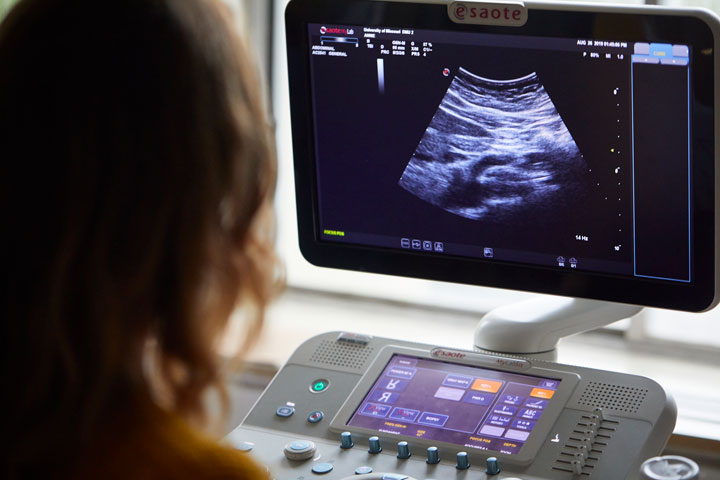What is diagnostic medical ultrasound?
Diagnostic Medical Ultrasound at Mizzou prepares students to become certified sonographers or ultrasound technologists. This cutting-edge imaging technique plays a vital role in diagnosing, monitoring, and guiding treatments for a wide range of medical conditions. Students are eligible to take specialty certification exams prior to graduation, setting them up for success in this dynamic field.
Don’t just take our word for it. Watch the video below to learn more about diagnostic medical ultrasound.
What classes will I take?
Before entering the clinical phase of the program, students complete general education requirements and program prerequisites. The program includes a secondary application process, where students must apply and be accepted to proceed to the clinical phase.
Diagnostic Medical Ultrasound students trained to become skilled ultrasound technologists, with instruction in four ultrasound specialty areas: cardiac, abdominal, OB/GYN, and vascular. This includes classes such as:
- Sonography Principals
- OB/GYN Ultrasound
- Adult Cardiac Ultrasound
- Clinical Experience
Are there experiential learning opportunities?
Yes! The University of Missouri believes in learning by doing. The Diagnostic Medical Ultrasound bachelor’s degree program includes approximately 1,600 hours of clinical experience. Students first learn how to perform scans in a supportive environment in our state-of-the-art ultrasound lab before participating in clinical rotations around the state.
Learn more about the DMU clinical experience.
Become a diagnostic medical ultrasound major
You can pursue a diagnostic medical ultrasound degree at any point in your career at MU. To begin the clinical phase of the Diagnostic Medical Ultrasound program, students must complete a secondary application and receive admission.
- New students: Apply to MU and choose Diagnostic Medical Ultrasound – Pre Health Sciences as your major.
- Current students: Declare or change your major.
Frequently asked questions
A major in diagnostic medical ultrasound is ideal for students who are interested in health care, have a strong aptitude for science and technology, and a passion for patient interaction. It is perfect for those who thrive in roles that demand both precision and compassion.
A bachelor’s degree in diagnostic medical ultrasound prepares graduates to sit for certification exams given by the American Registry of Diagnostic Medical Sonography (ARDMS). When you graduate from Mizzou, you will be qualified to work in many areas of specialization including abdominal ultrasound, obstetrics and gynecology, echocardiography, and vascular technology.
Mizzou’s Diagnostic Medical Ultrasound degree prepares you for your future by providing rotations at multiple medical facilities during the clinical phase. The program includes over 50 clinical sites across the state of Missouri, where students gain hands-on experience during their clinical training.
This program has a secondary application. Students typically apply to the clinical phase of the program during their sophomore year. Learn more about the DMU secondary application.
The Mizzou Diagnostic Medical Ultrasound program is competitive with an average of 40 students applying. The program accepts up to 20 students each year.
In addition to the University tuition and fees, room and board, and personal expenses, a Diagnostic Medical Ultrasound student will have additional costs associated with the program. View DMU program costs and fees.
Yes. The Commission on Accreditation of Allied Health Education Programs (CAAHEP) has accredited the Diagnostic Medical Sonography program upon the recommendation of the Joint Review Committee on Education in Diagnostic Medical Sonography (JRC-DMS). CAAHEP, 9355 – 113th St. N, #7709 Seminole, FL 33775, 727-210-2350, CAAHEP.org
